How to shop for pasture raised chicken

In This Article
High-quality animal products are the cornerstone of a nutrient-dense diet. With an emphasis on “high quality,” – sourcing matters! In a world of factory farming, conventional meat is cheap and easily available but contains fewer nutrients and can be inflammatory, not to mention bad for the animals and the planet.
This is especially true for chickens. Yet I’ve found that high-quality chicken products are particularly difficult to source. But I can’t do without a good roasted rotisserie chicken or some BBQed wings with a mug of homemade bone broth the next day! So here are the best options I’ve found to enjoy high-quality, earth-friendly, pasture raised chicken.
Contents:
- What To Look For When Choosing Meat
- Reading Labels: Organic Vs. Cage Free Vs. Pasture Raised Chicken
- Helpful Certifications When Reading Labels
- Why Choosing Pasture Raised Chicken Is Important
- Where Can You Buy Pasture Raised Chicken?
- Best Pasture Raised Chicken (Order Online)
- Best Pasture Raised Chicken (Grocery Store)
- Tips On How To Make Pasture Raised Chicken More Affordable
What To Look For When Choosing Meat
High-quality animal products have two key components:
- Healthy animals: The animals are raised in an environment as close as possible to their natural habitat, with space to move and time in the sun. They’re eating what they were designed to eat, with no antibiotics or hormones ever. Look for information on the packaging about what the animal was eating and where they were living.
- Healthy soil: Farmers restore rather than deplete the soil with regenerative farming practices such as rotational grazing and biodiversity. Look for packaging: regenerative agriculture certifications or language like “regenerative farming.”
Healthy soil leads to healthy animals, which leads to healthier food for people!
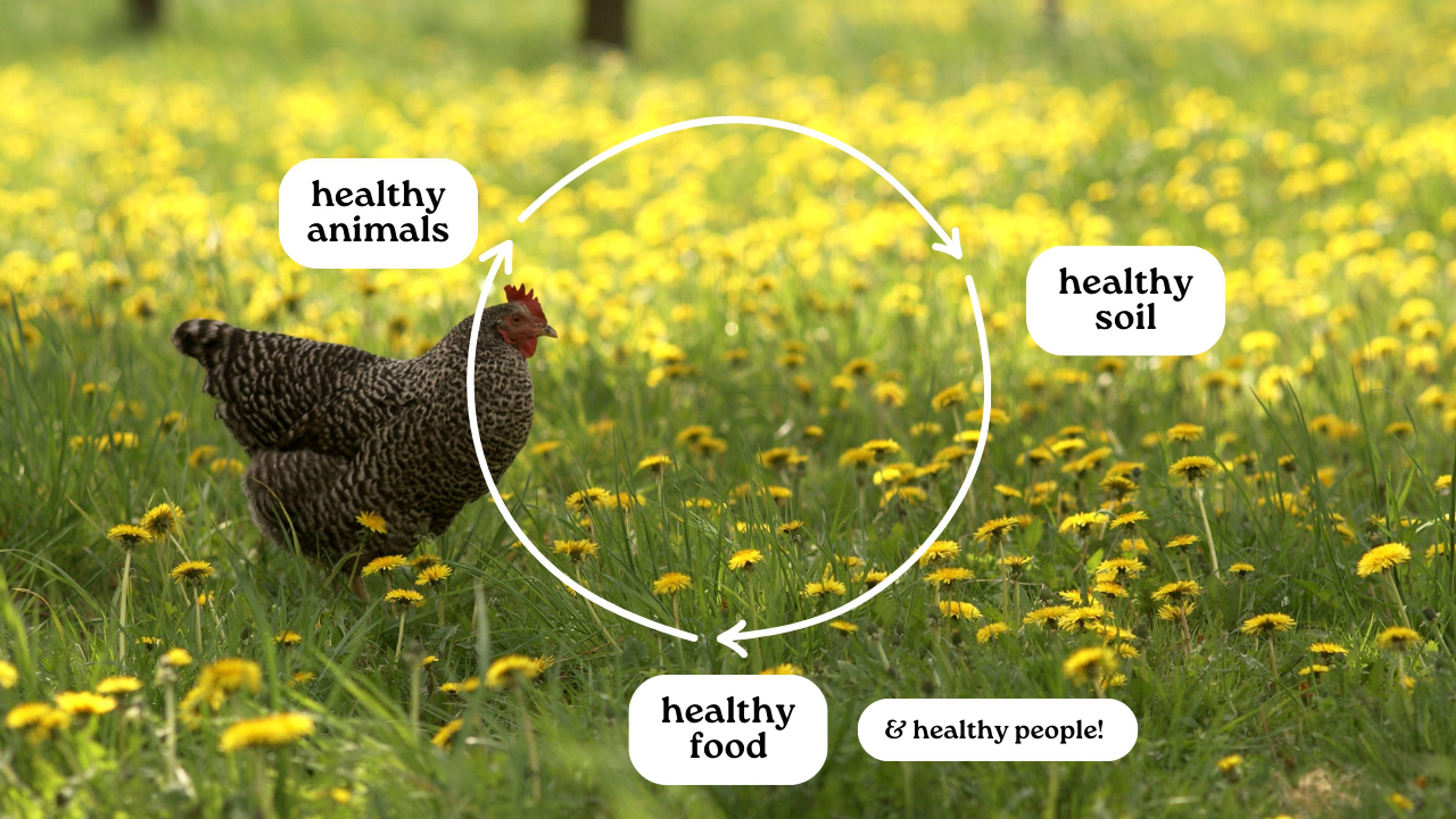
Reading Labels: Organic Vs. Cage Free Vs. Pasture Raised Chicken
When looking specifically at chicken, many different terms are thrown around on labels. Here are the key ones and what they mean:
Organic
- The chicken feed doesn’t contain pesticides, and the chickens were not given antibiotics.
- What this means: This label tells us a couple of things that are not included but doesn’t tell us anything about what the chickens eat or how they live.
Cage Free
- Rather than being in individual cages, the chickens have an average of 1 foot per chicken to move in a large indoor space.
- What this means: While this tells you where the chicken lives, it does not specify if they have access to pasture or sunshine. Unless otherwise stated, you can assume the chickens are also fed a typical grain-fed diet.
Free Range
- Each chicken has an average of 1.5-2 square feet in which to move, and the flock has access to the outdoors if they wish.
- What this means: Legally, this isn’t clearly defined, so some free-range farms have their chickens in a yard or pasture for several hours of the day, and others only offer a small door to a cement pad that the chickens never even visit because all the food is inside. Also, this label only tells you how the chickens live, not what they eat.
Pasture Raised
- The chickens live outdoors on a pasture with ample space to roam and are encouraged to exercise their natural foraging instincts. They’re rotated to fresh pasture regularly, and their diet is primarily bugs, worms, grubs, weeds, etc., that make up their natural diet.
- What this means: This is the best option for buying chicken (meat and eggs).
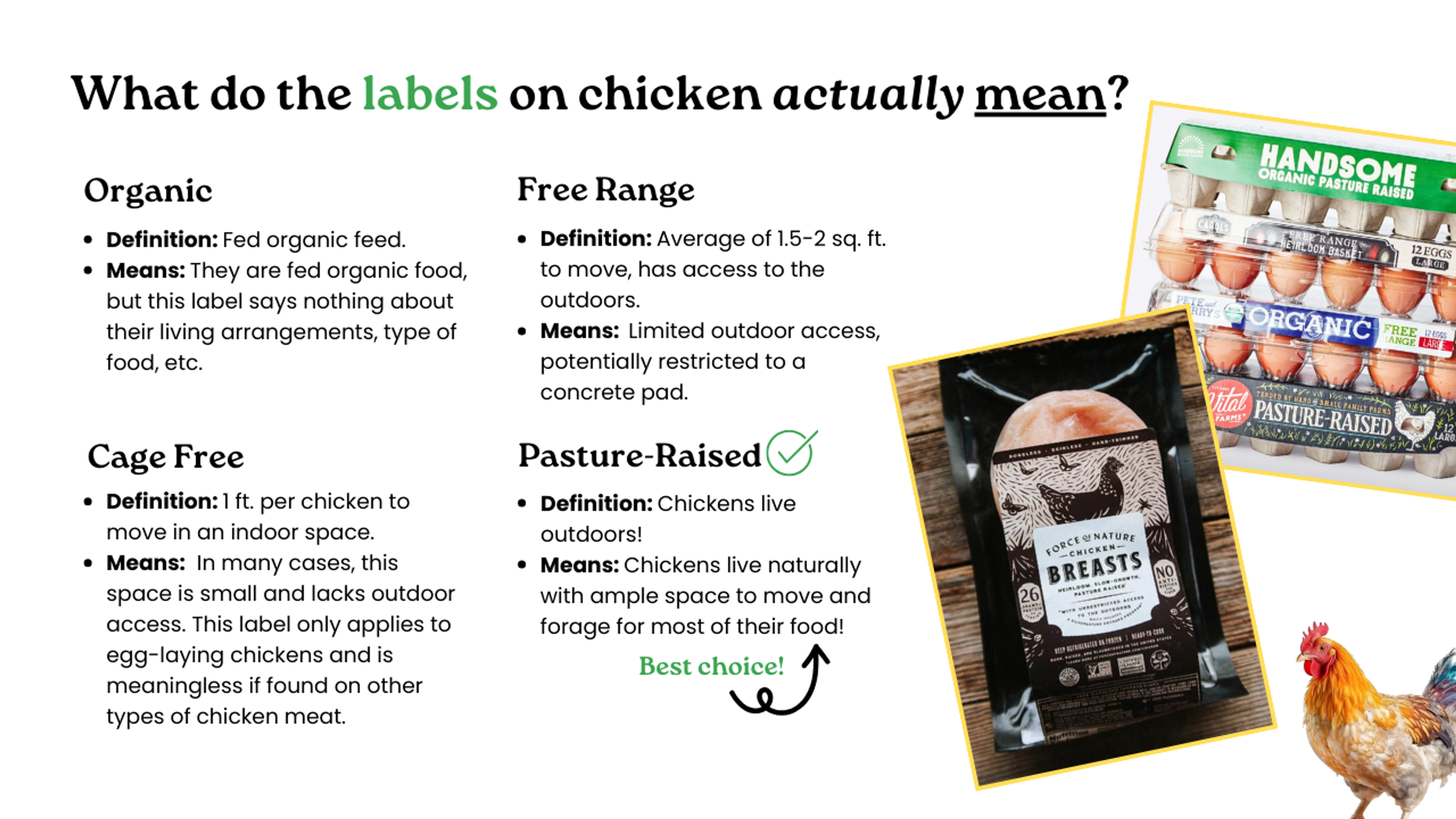
Helpful Certifications When Reading Labels
While certifications are not always held to consistent and legally regulated standards, meat with the below certifications is more likely to be healthier and to have been treated better than conventional meat.
5-Step G.A.P (Global Animal Partnership) Animal Welfare Certification
Ranking from baseline to 5 (highest), this certification evaluates the quality of living space, diet, and slaughter. At G.A.P 5 (the highest tier), chickens have access to outdoor spaces for natural foraging and are slaughtered on the farm, eliminating the need for transportation, which can be painful and stressful for the animals.
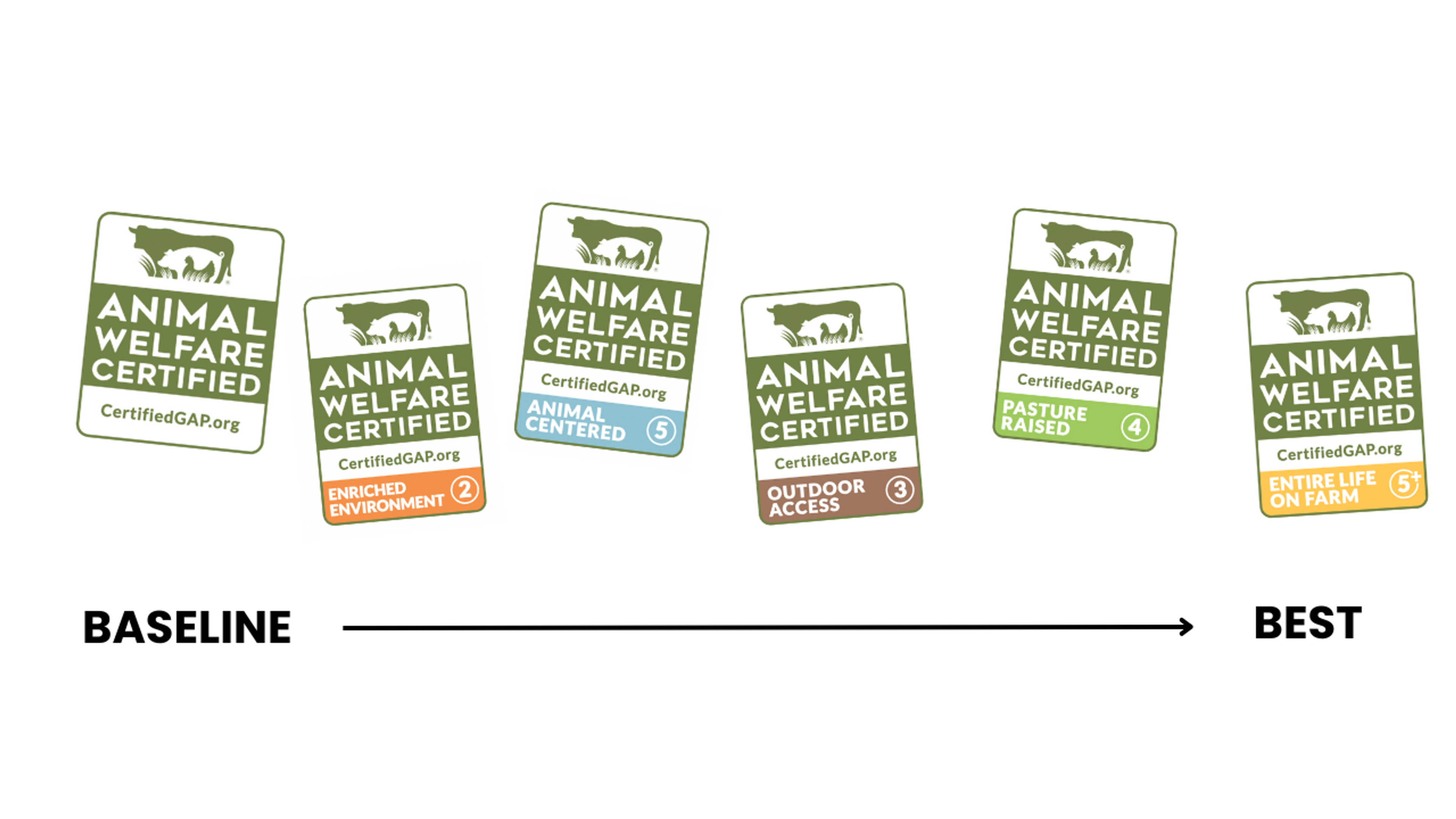
Humane Farm Animal Care DBA Certified Humane
This certification ensures that meat meets high standards for welfare, feed, treatment, and slaughter. They provide detailed documentation explaining their standards.
Certified Regenerative by AGW
A Greener World (AWG) is a nonprofit organization that supports independent farms and ranchers across North America in raising animals sustainably and producing meat, dairy, eggs, and fiber in ways that prioritize the well-being of the animals. They establish standards to ensure better care for both the animals and the land.
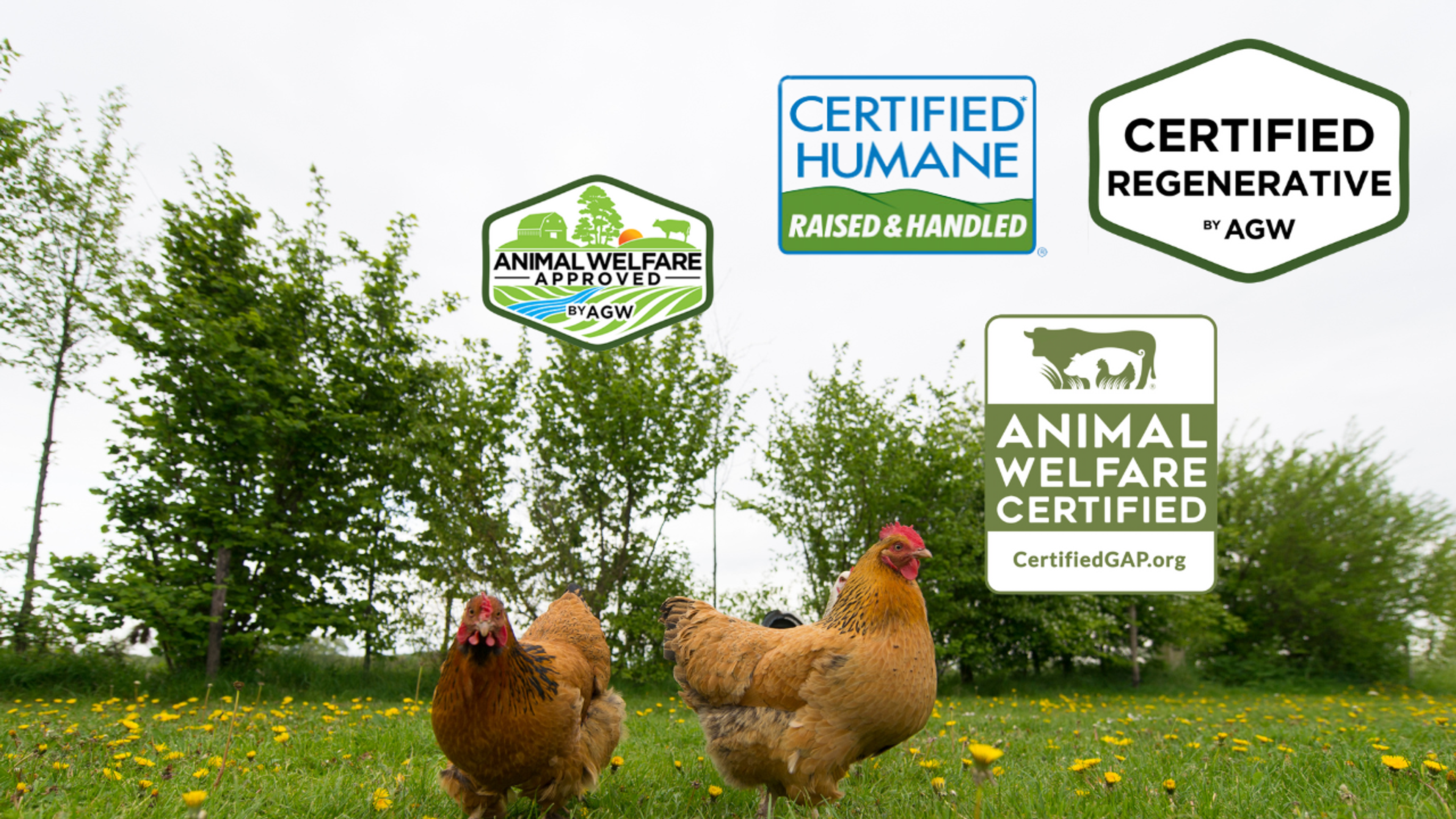
Why Choosing Pasture Raised Chicken Is Important
- Grain-fed Chicken is Pro-Inflammatory
- Pasture Raised Chicken Is More Nutritious
Grain-Fed Chicken Is Pro-Inflammatory
Chickens are monogastric animals (translation: they, like humans, have a single-compartmented stomach), so the nutritional profile of their meat is more directly related to the nutritional profile of their feed. That means it's extra important that chickens eat a healthy diet because that makes their meat (and eggs) healthier for you. What they eat really matters!
In contrast to a ruminant animal like a cow (which has a stomach with four different compartments), whose enhanced digestive capabilities insulate the final product a bit from unhealthy feed (but not entirely; grass-fed beef is still distinctly healthier than grain-fed).
Chicken feed composed of grains like corn has a high omega-6 to omega-3 fatty acids ratio. (Omega-6 fatty acids are inflammatory, whereas omega-3 fatty acids are anti-inflammatory, so the goal is a lower ratio with higher levels of omega-3s). Their meat will, therefore, have higher levels of omega-6 fatty acids.
The bottom line is that when you eat the meat of grain-fed chicken, you're getting a less nutritionally dense product that can drive inflammation almost as much as inflammatory omega-6-heavy seed oils.
Pasture Raised Chicken Is More Nutritious
Chickens raised on pasture get lots of exercise, fresh air, and sunshine, so their meat and eggs are markedly more nutritious.
Pasture raised chicken has higher levels of omega-3 and a lower omega-6:3 ratio. They also have higher levels of vitamins and minerals like D, E, and A.
Make sure to double-check the label for any information about supplementary feed (which is often necessary in the winter) to make sure it’s organic and mirrors the chicken’s natural diet (i.e., isn’t high in grains).
Plus, it tastes better!
Where Can You Buy Pasture Raised Chicken?
In my experience, it’s harder to find pasture raised chicken in normal grocery stores than it is to find grass-fed beef. That’s likely because raising chicken on pasture is more labor-intensive than pasture raised beef, especially in the winter. Also, avian influenza outbreaks have dampened the chicken market for the last few years.
Below are the best options I’ve found for sourcing pasture raised chicken.
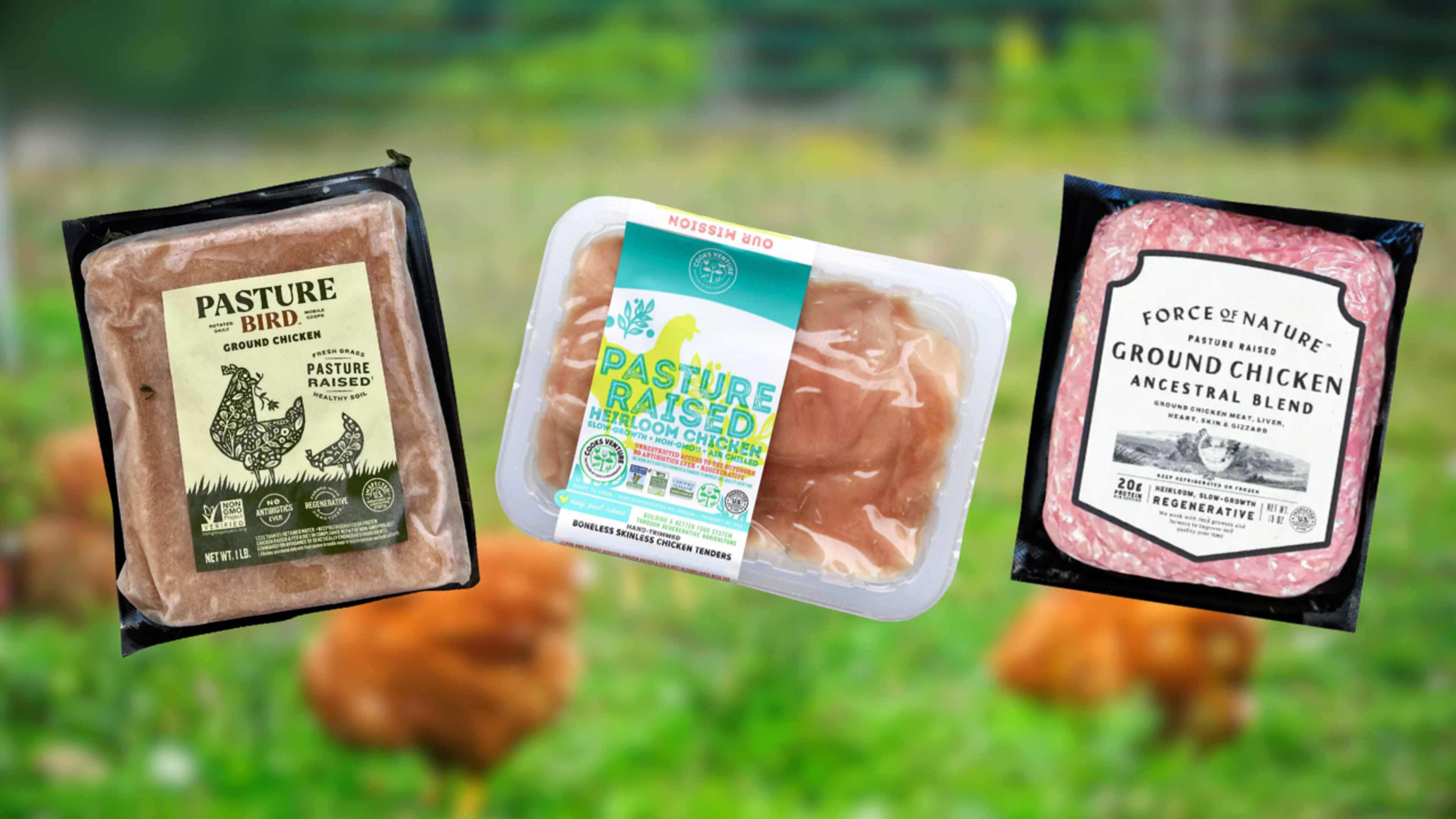
Best Pasture Raised Chicken (Order Online)
Pasture Bird
Pasture Bird is the best online source for nutrient-dense, pasture raised chicken I’ve seen.
The chickens are raised outside on pasture 24/7/365 and rotated to new grass every single day. With lots of movement, sunshine, and fresh air, the birds are naturally healthy and never have a single antibiotic or drug.
Force of Nature
All Force of Nature animals are raised in environments that encourage the expression of their natural behaviors while consuming the diets they were biologically engineered and evolved to eat. Farmers practice regenerative farming practices, and their chickens are born, bred, and raised in Arkansas on 800+ acres of pasture and small farms in Oklahoma, too. The chickens’ diets consist of bugs, seeds, nuts, and fruits with some non-GMO feed. You can order from their website or purchase in-store at places like Whole Foods.
Cooks Venture
The above options are the best we’ve found, but Cooks Venture also offers an excellent place to source chicken (and other meats). Their chickens are pasture raised on regenerative farms across the United States and fed quality diets. Check out this cute video showing all the space their chickens have to forage and explore!
Good Ranchers
Good Ranchers pasture raises all of their chicken (and beef) sourced from local, independent farms in the United States, which is a plus! They are proud of the high quality of their meat and use no antibiotics or hormones.
Best Pasture Raised Chicken (Grocery Store)
Trader Joe’s
Trader Joe’s has an heirloom pasture raised chicken option. However, it doesn't list any humane or welfare certifications.
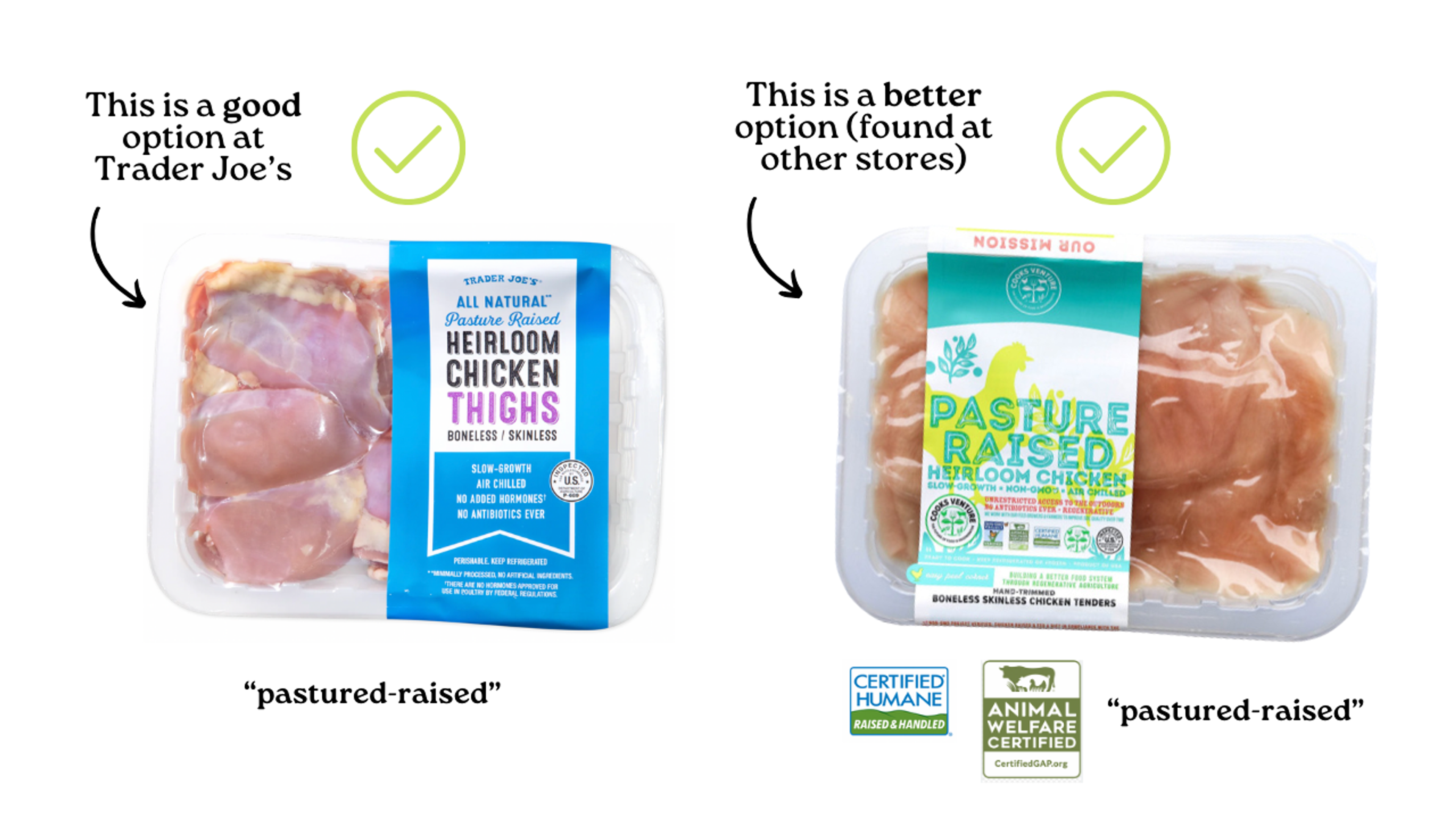
Whole Foods
All meat at Whole Foods requires baseline standards that are higher than those at your average grocery store. For example, none of the chickens they sell were ever given antibiotics or added hormones or were raised in cages, and their slaughter met certain humane criteria. Starting with that baseline, any of their “pasture raised” will likely be a good option. They also sell brands like Force of Nature, Good Ranchers, and Cooks Venture in-store.
Check Your Local Farms!
Check your local Weston A Price Foundation chapter for a list of farms near you with high animal feed standards and quality of life.
Tips On How To Make Pasture Raised Chicken More Affordable
There’s no question this is better for you, but there’s also no question that it’s more expensive.
Here are some ideas for making it more affordable:
- Buy the whole bird instead of cuts like thighs or breasts. It’s almost always cheaper per ounce.
- If you buy the whole chicken, get the heaviest one you can find. The heavier the bird, the more poundage of meat (smaller birds have proportionately more bone)
- Use the bones to make bone broth.
- Eat organ meat! Chicken liver is super nutritious, milder in flavor than beef liver, and pretty often super cheap per pound.
Remember that by choosing more expensive pasture raised meat, you are also getting more nutrients and better value for your money, not to mention the peace of mind that the animals were treated responsibly.
These are the best options for pasture raised chicken. Now go enjoy your chicken dinner!
Related articles

Best period underwear: Options for every flow (2026)
Discover the best period underwear for 2026—organic, PFAS-free options that actually work. Research-backed reviews & brands to avoid. Shop safer today!

Your guide to organic tampons (what to look for & best brands) - 2026
Your period products matter for your long-term health. Choosing organic tampons is one of the best ways to avoid harmful chemicals and additives that may...

Is your tap water toxic? How to choose the best water filters
Find the best water filters to remove PFAS, microplastics, lead, and more. Is your tap water really safe? Just because tap water meets legal standards...


